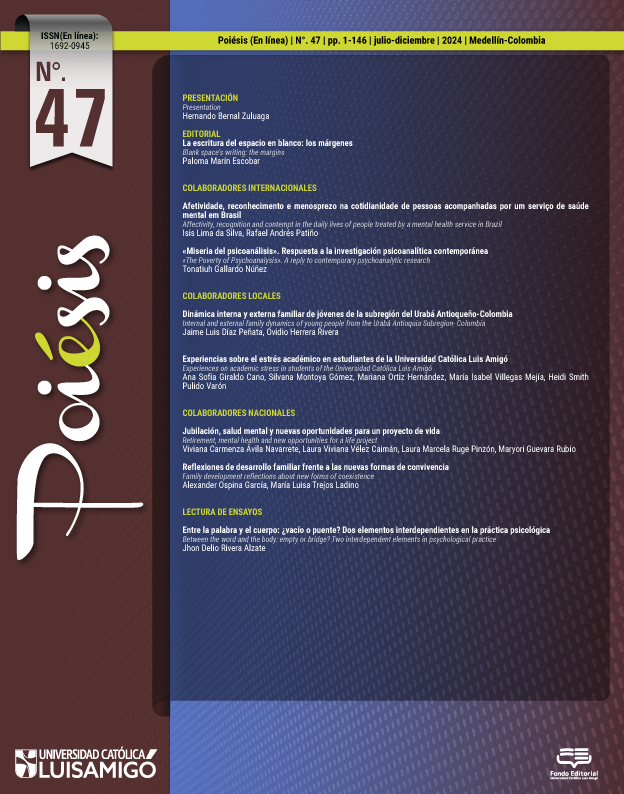Between the word and the body: empty or bridge? Two interdependent elements in psychological practice
DOI:
https://doi.org/10.21501/16920945.4854Keywords:
Vocational training, Psychotherapy, Consultant, Discomfort, Practice, Psychology, Reason for consultationAbstract
The internship process of the psychologist in training places him/her in front of a challenging field of action. The trainee could say that this formative stage is enriching as he/she finds the opportunity to articulate theory and practice to face the demands of the social and individual reality that he/she investigates, analyzes, interprets, and intervenes; it is even an experience that leads him/her to think of him/herself at a personal and professional level. In this reflection article, the author proposes to talk about three elements that have been indispensable in his psychological practice, individual attention, and group processes, for example: the manifest reason for consultation vs. the latent reason for consultation; the body and its narratives; and the analogy of the psychologist's role as midwife of the truth that helps to give meaning to the consultant's discomfort. It is concluded that the practicing psychologist must constantly make a critical and reflective exercise on the reality of the other, but it is also his task to lead him to ask himself about his motivations in his search for wellness.
Downloads
References
Barrero Cuellar, E. (2020). Clínica Psicopolítica: Aportes para la construcción de una psicología de la subversión en tiempo del horror Neoliberal. Ediciones Cátedra Libre.
Franco, V. A. (2019). Los efectos de la palabra en psicoterapia desde la perspectiva de las neurociencias. Rev. Digital Prospectivas en Psicología, 3(2), 27-31. https://www.kennedy.edu.ar/wp-content/uploads/2019/10/2019_07_Revista-Prospectiva_carta.pdf
Martínez Farrero, P. (2006). Del motivo de consulta a la demanda en psicología. Rev. Asociación Española de Neuropsiquiatría, 26(97), 53-69. https://scielo.isciii.es/scielo.php?pid=S0211-57352006000100004&script=sci_arttext
Martínez Ortiz, E. (2012). El Diálogo Socrático en la Psicoterapia. Ediciones SAPS.
Quiroz Trujillo, A., Velásquez Velásquez, A. M., García Chacón, B. E. y González Zabala, S. P. (2002). Técnicas Interactivas para la investigación social cualitativa. https://proyectos.javerianacali.edu.co/cursos_virtuales/posgrado/maestria_asesoria_familiar/proyectos_I/m%C3%B3dulo%202/Tecnicas%20Interactivas%20-%20Quiroz.pdf
Van Der Kolk, B. (2020). El cuerpo lleva la cuenta: cerebro, mente y cuerpo en la superación del trauma (2° edición). Editorial Eleftheria.
Vásquez Rodríguez, F. (1999). Avatares: analogías en búsqueda de la comprensión del ser maestro. Signo y Pensamiento, 18(34), 117-124. https://revistas.javeriana.edu.co/index.php/signoypensamiento/article/view/3008
Published
How to Cite
Issue
Section
License

This work is licensed under a Creative Commons Attribution-NonCommercial-NoDerivatives 4.0 International License.
La revista y los textos individuales que en esta se divulgan están protegidos por las leyes de copyright y por los términos y condiciones de la Licencia Creative Commons Atribución-No Comercial- 4.0 Internacional. Permisos que vayan más allá de lo cubierto por esta licencia pueden encontrarse en http://www.funlam.edu.co/modules/fondoeditorial/ Derechos de autor.











